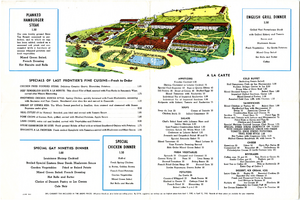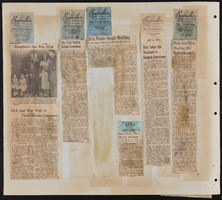Search the Special Collections and Archives Portal
Search Results
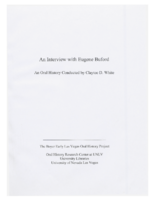
Transcript of interview with Eugene Buford by Claytee D. White, September 12, 2006
Date
Archival Collection
Description
Interview with Eugene Buford conducted by Claytee D. White on September 12, 2006. Buford came to Las Vegas as a child from Birmingham, Alabama. He held a variety of jobs, including washing dishes at the Last Frontier and delivering ice to casinos like the Flamingo and the Stardust, and ultimately retired after thirty-six years with the Post Office. Buford's great grandmother, Mary Nettles, was instrumental in the formation and growth of the NAACP chapter in Las Vegas, and he recalls meetings in her house and his own role as president of the Junior League NAACP. Buford shares memories of historical locations and events such as Helldorado, Block 16, and Carver Park, and several important figures in Las Vegas history, including James B. McMillan, Charles West, Jimmy Gay, Benny Binion, and the mafia.
Text
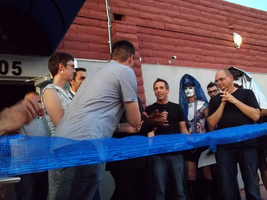
James Healey, Heidi Swank, Ruben Kihuen, Tony Clark, and Mother Loosey Lust Bea Lady (Tracy Skinner) and others attend the Club Metro bar grand opening, Las Vegas, Nevada: digital image
Date
Archival Collection
Description
Image
Amilcar "Ace" Daniels oral history interviews
Identifier
Abstract
Oral history interviews with Amilcar “Ace” Daniels conducted by Rodrigo Vazquez and Monserrath Hernández on June 15, 2019 and June 22, 2019 for the Latinx Voices of Southern Nevada Oral History Project. In the first interview, Daniels discusses growing up in Las Vegas, Nevada and shares his parents' emigration story from the Dominican Republic to the United States in the early 1980s. He talks about attending the College of Southern Nevada (CSN), the University of Nevada, Reno (UNR), and the University of Nevada, Las Vegas (UNLV). Later, Daniels speaks on his career in hospitality, his passion for live theater, and his advocacy for the performing arts in Las Vegas. He talks about being a minority person in the hospitality industry, the importance of maintaining his cultural identity, and Latino representation in theater. In the second interview, Daniels discusses his involvement with the non-profit arts organization Super Summer Theatre, and participating in the Las Vegas Pride Festival. Lastly, Daniels talks about issues of colorism in the Latinx community.
Archival Collection
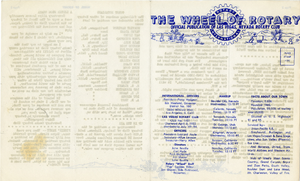
The Wheel of Rotary Las Vegas Rotary Club newsletter, May 4, 1950
Date
Archival Collection
Description
Text
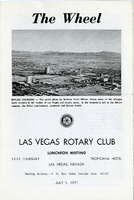
The Wheel Las Vegas Rotary Club newsletter, July 1, 1971
Date
Archival Collection
Description
Text
Lori Lipman Brown Papers
Identifier
Abstract
The Lori Lipman Brown Papers date from 1975 to 2009 and document former Nevada State Senator Lori Lipman Brown's political career. It includes correspondence and materials from Brown's service as a Nevada State Senator from 1992 to 1994, case files from her defamation lawsuit against Nevada State Senator Kathy Augustine, and papers from her work opposing the Nevada Question 2 ballot measure on same-sex marriage in 2000. The collection also contains photocopies of biographical materials and personal and publicity photographs of Brown, as well as material from her time working with local high school and commmunity theatre programs.
Archival Collection

Transcript of interview with Ron Donoho by Craig Brenner, February 28, 1978
Date
Archival Collection
Description
Text
Bailey, William Henry, 1927-2014
Alternate Names
William H. "Bob" Bailey was born in 1927 and came to Las Vegas in 1955. First employed as an assistant producer and master of ceremonies in the first interracial hotel in Nevada, the Moulin Rouge, he describes the impact that hotel had on black entertainers during its brief existence. Bailey says the hotel brought life to the Westside where, in 1955, there were only a few telephones and the streets were largely unpaved.
Person

